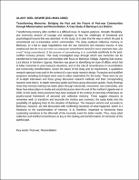| dc.description.abstract | ALANY JOEL OKWIR (2011-M161-10002)
Transforming Memories: Bridging the Past and the Future of Post-war Communities through Memorisation and Reconciliation: A Case Study of Barlonyo Lira District
Transforming memory after conflict is a difficult issue. It requires patience, strength, flexibility, and enormous amount of courage and strategies to face the challenges of emotional and psychological trauma that was absorbed. In this study, it is clear that the way in which the past is remembered can re-traumatise victim communities. The study explored collective memory in Barlonyo, in a bid to stage negotiations over the war memories and massacre trauma. It was emphasised that the way an event is (a massacre) remembered should be more important than „the event‟ being remembered, if the process of remembering is to contribute positively to the post-conflict recovery process. This study investigated ways through which war memories can be transformed to heal post-war communities with focus on Barlonyo Village, Agweng Sub-county, Lira district in Northern Uganda. Attention was given to identifying the state of affairs which led to bitter memories in post-massacre situations, and on the role of remembrance in reconciliation and community transformation. Given the nature of the study and its requirement, a qualitative research approach was used in the context of a case-study research design. Purposive and stratified purposive sampling techniques were used to select respondents for the study. These were by use of in-depth interviews and focus group discussion research methods and their corresponding research tools that is; in-depth interview guides and focus group discussion guides. Study findings show that memory-making has taken place through memorials, monument, and ceremonies, and these have taken place in media and social discourses since the end of the northern Uganda war in 2006. In this study, these processes have been analysed in the context of vast body of literature on psycho-social framework of personal and collective memory. These suggest measures to remember well, to transform and reconcile the victims and survivors; the study looks into the possibility of applying them to the situation of Barlonyo. The massacre victims and survivals in Barlonyo, however, are still discounted with conflicting narratives of what happened, which is a hindrance to the transformation of memory. It is, therefore, important to harmonise these contending narratives in the aftermath of the traumatic event for better results. Thus, many cited collective and truthful remembrance as key to the healing and transformation of memories of the painful past.
Key words: Post-war, Reconciliation | en_US |


